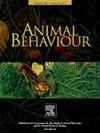导航过程中的线索相关性是规模和经验的函数
IF 2.3
2区 生物学
Q2 BEHAVIORAL SCIENCES
引用次数: 0
摘要
尽管一些物种在所有环境中对刺激表现出简单或固定的反应,但许多物种表现出高度可变的行为反应,其中传入的感官线索和先前经验的相对重要性因环境而异。为了研究动物在导航时如何利用实时全局和局部线索和经验的复杂性,我们对不受约束、自由导航的海龟进行了两个互补的野外实验。我们操纵了当地和全球线索的可用性,并在所有或只有部分东方彩绘龟有先前经验的条件下,监测了个别东方彩绘龟的导航能力。在缺乏经验和所有局部线索的情况下,所有海龟都成功地仅使用全局线索进行导航。然而,当动物在熟悉的区域导航时,它们忽略了之前对其做出反应的实验性全局线索的存在,这表明先前的知识(即记忆)在导航过程中的重要性。相比之下,缺乏经验的海龟使用局部线索成功导航,直到出现全局线索,这时,这些海龟只使用全局线索。总之,这些实验使我们能够解决在决策过程中使用的线索层次的相对重要性。这些结果证明了学习和导航经验的价值,以及这种经验对全局和局部线索的相对重要性的影响。本文章由计算机程序翻译,如有差异,请以英文原文为准。
Cue relevance during navigation is a function of scale and experience
Although some species exhibit simple or fixed responses to stimuli across all contexts, many species exhibit highly variable behavioural responses, where the relative importance of incoming sensory cues and prior experience varies with context. To address the complexity of how animals utilize real-time global and local cues and experience while navigating, we conducted two complementary field experiments on unrestrained, freely navigating turtles. We manipulated the availability of local and global cues and monitored the navigation abilities of individual eastern painted turtles, Chrysemys picta, under conditions where either all or only some turtles had prior experience. In the absence of experience and lacking all local cues, all turtles successfully navigated using a global cue alone. However, when animals were navigating familiar areas, they ignored the presence of an experimental global cue to which they had previously responded, suggesting the importance of previous knowledge (i.e. memory) during navigation. In contrast, turtles lacking experience successfully navigated using local cues, until presented with global ones, at which point, these turtles used only global ones. Together, these experiments allow us to address the relative importance of cue hierarchies used during decision making. These results demonstrate the value of learning and experience in navigation and the impact this experience has on the relative importance of global and local cues.
求助全文
通过发布文献求助,成功后即可免费获取论文全文。
去求助
来源期刊

Animal Behaviour
生物-动物学
CiteScore
4.60
自引率
8.00%
发文量
236
审稿时长
10.2 weeks
期刊介绍:
Growing interest in behavioural biology and the international reputation of Animal Behaviour prompted an expansion to monthly publication in 1989. Animal Behaviour continues to be the journal of choice for biologists, ethologists, psychologists, physiologists, and veterinarians with an interest in the subject.
 求助内容:
求助内容: 应助结果提醒方式:
应助结果提醒方式:


